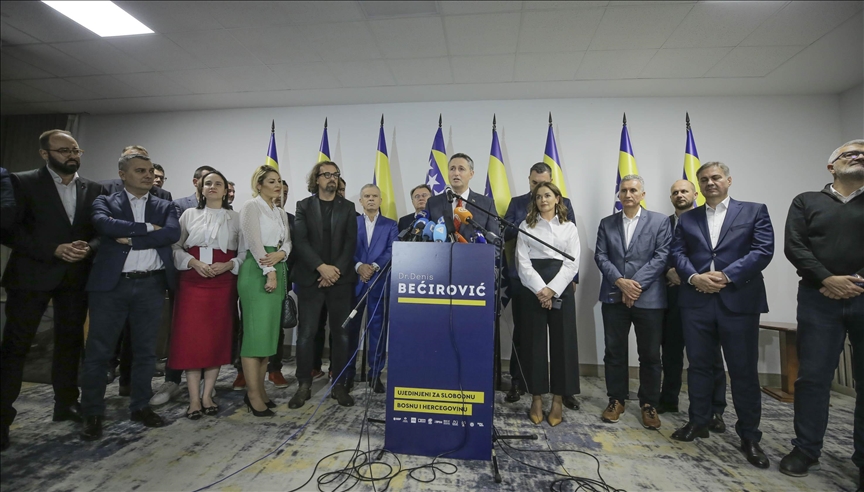BELGRADE, Serbia
Voters in Bosnia and Herzegovina elected new representatives of the three-member Presidential Council on Sunday.
According to the unofficial results of the general election from the Central Election Commission (CIK), Social Democratic Party candidate Denis Becirovic secured the Bosniak seat, incumbent Zeljko Komsic won the Croat seat and Alliance of Independent Social Democrats candidate Zeljka Cvijanovic took the Serbian seat.
The results are based on 54.3% of processed polling stations.
CIK earlier announced that the turnout was 50%.
Becirovic said it is time for a positive turn in Bosnia and Herzegovina.
“Any destabilization in the region would return us to the Middle Ages. We have no right to do that…Let’s unite around the future and around life’s issues. That’s what all people and nations in Bosnia and Herzegovina need,” he said.
According to the preliminary results, Becirovic, the joint candidate of 11 parties, has a convincing advantage over the president of the Democratic Action Party (SDA), Bakir Izetbegovic, and the president of the Platform for Progress Movement, Mirsad Hadzikadic.
Meanwhile, Komsic expressed his gratitude to the citizens.
“We can talk about one not radical but still change on the political scene in Bosnia and Herzegovina,” he said.
In the other entity of Bosnia and Herzegovina, Republika Srpska (RS), 23% of the votes were counted.
According to data from the Union of Independent Social Democrats (SNSD), SNSD candidate Cvijanovic won 60% of the vote and became the Serbian member of the council, while Serb Democratic Party candidate Mirko Sarovic received 35%.
Meanwhile, Milorad Dodik, who is running for RS president, is reported to have lost to his rival, Jelena Trivic.
Voters in Bosnia and Herzegovina headed to the polls Sunday to choose lawmakers at the canton, entity, and national levels as well as the three members of the Presidential Council.
More than 5,900 polling stations across the country opened at 7 a.m. local time (0500GMT) to receive voters for 12 hours, according to the Central Election Commission, with 60,000 observers on duty on election day.
Around 3.3 million people are expected to vote for members of parliament in the country’s two entities — the Federation of Bosnia and Herzegovina and Republika Srpska — as well as 10 cantons within the Federation of Bosnia and Herzegovina.
Voters are also choosing representatives for the Presidential Council and the national parliament.
Bosnia Herzegovina’s political structure is often dubbed one of the most complicated in the world.
A total of nine candidates are competing for the Bosniak, Serb and Croat seats of the Presidential Council.
This is the least number of candidates since 2002 when the four-year mandate was introduced.
That year, 35 candidates competed for membership, with the number since rapidly falling with each election.


